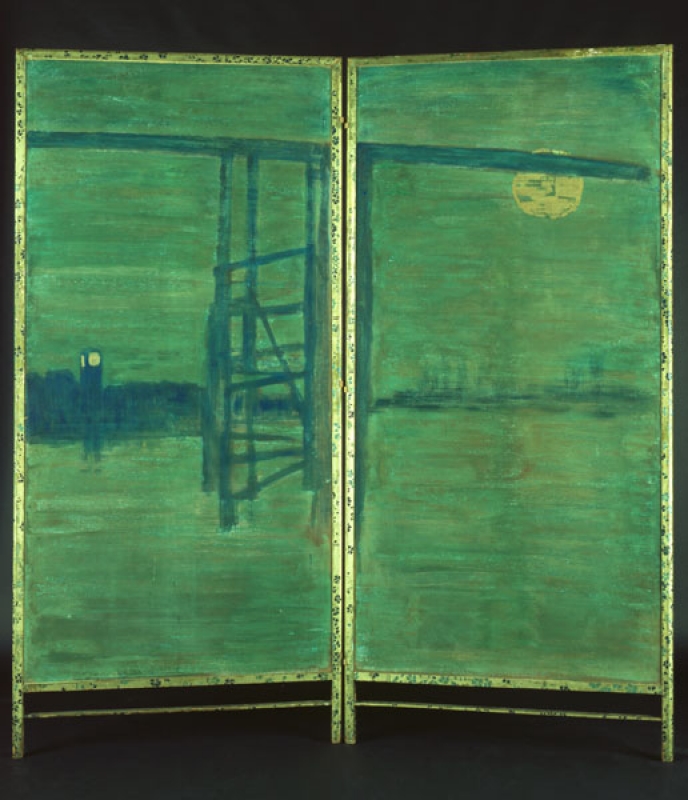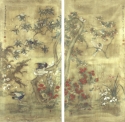Titles
Minor variations on the title are as follows:
- 'Screen – Blue and Silver' (1874, Flemish Gallery). 1
- 'Blue and Silver: Screen, with Old Battersea Bridge' (1980, YMSM). 2
The 1980 title 'Blue and Silver: Screen, with Old Battersea Bridge' combines Whistler's original title with a site specific reference, and has become the accepted title.
Description
A screen with two vertical panels; when fully open the screen is nearly square.
Recto by James McNeill Whistler: on the right side of the left-hand panel is a timber pier of Old Battersea Bridge, and one of its massive wooden piles extends onto the right panel. The roadway of the bridge runs across near the top, curving slightly down to right, and cutting across the top of a golden moon. Seen under the arch of the bridge at left, on the river bank is a church tower with golden clockface, reflected in the water, and at right are the scaffolding and timbers of another bridge, and, beyond that, buildings on the river bank fading into the distance.
Verso by Nanpo Jyoshi (Osawa Nampo, b. 1845): oil and watercolour on silk, signed and inscribed in Chinese characters on the right screen, 'This work was painted near Meirindo by Nampo in third period of ten days of July 1867', and on the left screen, 'This work was painted near Meirindo by Nampo in first period of ten days of August 1866.' Originally part of a larger screen, these panels, by the Japanese woman artist Nanpo Jhoshi, were painted with doves, flowering shrubs, and plants in a Chinese style.
Site
Whistler's screen shows a nocturnal view of the Thames from upstream, with a pier of Old Battersea Bridge in the centre, and beyond it, the clock tower of Chelsea Church on the panel at left, and the Albert Suspension Bridge in the far distance on the panel at right.
The Albert Suspension Bridge was then under construction, as seen in Whistler's drawing, The new Albert Bridge, seen through old Battersea Bridge [M.0480], reproduced above.
According to The Times of 23 August 1871, 'a timber staging resting upon piling across the river from shore to shore was completed and opened on Monday', and on 20 October it described 'the largest cylindrical iron castings ever made' as the being 'in the course of erection', to support four sets of towers for the bridge. 3

J. Hedderly, Looking west towards ... Battersea Bridge , photograph, Royal Borough of Kensington & Chelsea Libraries
Photographs by Whistler's friend, James Hedderly (ca 1815-d.1885), show Battersea Bridge in the mid-1870s. 4
Comments
The Hunterian website commented:
'This important work strikingly combines Whistler's interests in night-time views, the Thames, the decorative arts, and the art of the Far East. ... The format of a decorated folding screen derives directly from oriental models. Whistler has been credited with being the first western screen-maker to experiment with the concept of a folding image.' 5
A development of the composition of the screen is seen in the slightly later Nocturne: Blue and Gold - Old Battersea Bridge [YMSM 140].
The screen is also seen in the background of a pastel, r.: A nude girl in front of a screen; v.: Illegible [M.1388], and in Harmony in Blue and Gold: The Little Blue Girl [YMSM 421], which was probably started in Paris in 1893/1894 but on which Whistler continued to work for some years.
Notes:
1: Mr Whistler's Exhibition, Flemish Gallery, 48 Pall Mall, London, 1874 (not numbered).
2: YMSM 1980 [more] (cat. no. 139).
3: Anon., 'The Albert Bridge at Chelsea', The Times, London, 23 August 1871, p. 8; anon., 'A Monster Casting', The Times, London, 23 August 1871, p. 6.
4: MacDonald, Margaret, and Patricia de Montfort, An American in London: Whistler and the Thames, Dulwich Picture Gallery, Addison Gallery of American Art, Freer Gallery of Art, 2013-2014 (cat. nos. 92-93), and see also cat. nos. 89-90 (photographs by Henry Taunt, and by York & Son).
Last updated: 28th December 2020 by Margaret










